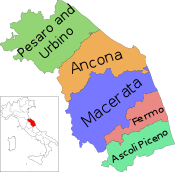Central Marchigiano dialect
According to internal variation, Marchigiano is divided into two main areas: Features that distinguish Marchigiano in general from Italian include: The verbs meaning 'be' and 'have' inflect as follows in the present indicative: The Ancona dialect is spoken only in Ancona and has only recently spread its influence elsewhere (Falconara, Osimo, Jesi, Chiaravalle, Porto Recanati, Loreto and Senigallia).For instance, the masculine singular definite article is always el, without anything comparable to the Italian variation, according to phonetic context, between il and lo.Only the speakers from towns which are closer to Macerata (Osimo, Castelfidardo, Loreto, Porto Recanati) use the form lo as in Italian.Rhotacism of /l/ occurs in this dialect, such that the local equivalents of Italian calza 'sock' and fulmine 'lightning' are carza and furmine.Notable features are rhotacism of /l/ and various assimilations that are absent from Italian: The following is a list of Marchigian words; note that the Anconitan forms do not show gemination[3] (babu, ciambòtu, nèrtu, etc.)
VerdicchioMarcheAnconaMacerataLanguage familyIndo-EuropeanItalicLatino-FaliscanRomanceItalo-WesternItalo-DalmatianCentral ItalianISO 639-3Linguist ListGlottologLinguasphereUnicodeUmbrianTuscanstandard ItalianFabrianoCamerinoApocopestressedFalconaraChiaravallePorto RecanatiLoretoSenigalliaGallo-ItalicCastelfidardoUmbriaRhotacismAnconitangeminationCentral Italian dialectsSabino dialectProvinces and placesAscoli PicenoPesaro e UrbinoList of communesAger GallicusSenonesDuchy of SpoletoRepublic of AnconaPapal StatesMarch of AnconaDuchy of UrbinoRoman RepublicPoliticsElections in MarcheList of presidents of MarcheDialectLanguages of ItalyAlbanianCatalanCroatianFrenchFranco-ProvençalFriulianGermanicOccitanRomaniSardinianSloveneWenzhouneseItalo-RomanceItalianRegional ItalianFlorentineCentral-Northern LatianMarchigianoMarineseRomanescoSabinoIntermediate Southern (Neapolitan)BeneventanoBareseCastelmezzaneseCilentanIrpinianArianeseMolisanSouthern LatianTarantinoVasteseExtreme SouthernSalentinoMandurianoSicilianPantescoCorsicanGallureseSassareseCampidaneseLogudoreseOccitano-RomanceAlghereseVivaro-AlpineMentonascNiçardGallo-RomanceAostanValdôtainFaetarLigurianBrigascGenoeseIntemelioMonégasqueRoyascTabarchinoLombardWestern LombardBrianzöö dialectsCanzésBustocco and LegnaneseLegnaneseComasco-Lecchese dialectsComascoLaghéeVallassineseLeccheseMilaneseTicineseOssolano